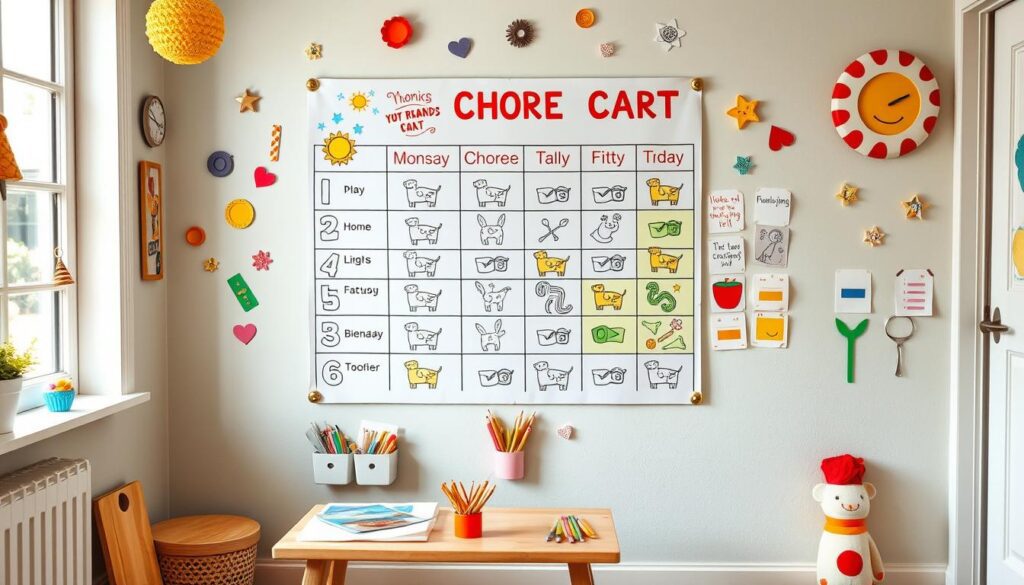As a parent, there’s a unique joy in watching your kids grow, explore, and stumble through the world around them. At around age 4, a magical transition begins: it’s a time when kids move from play into the realm of responsibility. Chores for 4-year-olds not only aid in their development but also establish a sense of belonging and importance within the family unit. Seeing your kids light up when they successfully clear their own place setting or help dust a shelf can create delightful moments that will be cherished for years to come.
Through these fun household jobs, you nurture your kids’ budding independence while instilling a valuable lesson about teamwork and contribution. The adventures of tackling chores together can transform mundane tasks into joyful experiences, making every small achievement a celebrated milestone for your kids.
Key Takeaways
- Children around age 4 can start engaging in simple chores.
- Incorporating chores fosters a sense of responsibility and independence.
- Establishing a cleaning routine can be challenging but rewarding.
- Fun activities, like games, can transform chores into enjoyable experiences.
- Consistency mixed with creativity promotes effective chore participation.
Why Chores are Important for Preschoolers
Engaging preschoolers in chores plays a crucial role in their development. These experiences offer a foundation for building life skills early in a child’s life. Tasks like making their beds or sorting toys may seem small, yet they contribute significantly to teaching kids responsibility and independence.
Building Life Skills Early
According to parenting expert Jim Fay, children need to feel needed within their families, which can be accomplished by involving them in preschool chores. Simple tasks provide opportunities for developing essential skills that impact education, relationships, and future careers. Research by University of Maryland psychology professor Roger W. McIntire highlights that introducing responsibilities to children as early as age two can enhance their problem-solving abilities and time management. Positive outcomes emerge when children participate in household tasks that resonate with their capabilities.
Teaching Responsibility and Independence
Starting with age-appropriate chores enables children to build a sense of duty that fosters independence. As they engage in tasks like feeding pets or assisting with light cleaning, they learn the value of contributing to family life. Elizabeth Pantley emphasizes clear instructions and the gradual introduction of chores to make the transition smoother for young ones. Families often experience success by establishing chore charts, making expectations clear and structured. The rewarding feelings of accomplishment that come from completing tasks help nurture confidence and elevate self-esteem.
Age-Appropriate Chores for 4-Year-Olds
Introducing age-appropriate chores to 4-year-olds lays a foundation for responsibility and teamwork. Engaging children in toddler household tasks enhances their motor skills and confidence while making them feel part of the family. Simple, enjoyable chores can offer little ones a sense of accomplishment, allowing them to contribute meaningfully to their home environment.
Simple Tasks They Can Handle
4-year-old chores can include a variety of straightforward activities that are manageable for young children. For instance, they can wipe up spills, use an e-cloth to clean surfaces, or handle a small vacuum. Such tasks not only help keep the home tidy but also make chores fun. By introducing simple activities, children begin to see the value of their contributions.
Encouraging Participation with Small Jobs
Involving young children in manageable tasks cultivates their eagerness to help. Picking up toys or sorting laundry can be excellent starting points. Each small job reinforces the idea of teamwork, fostering a sense of belonging within the family unit. Establishing a routine around these age-appropriate chores can lead to greater participation as they grow older.
Chores for 4-Year-Olds: 11 Fun Household Jobs They’ll Enjoy
Introducing chores to preschoolers can be a rewarding experience for both parents and children. The right tasks will not only foster essential life skills but can also be enjoyable for little ones. Engaging chores transform routine responsibilities into fun activities for kids, allowing them to contribute to household duties while learning valuable lessons.
Examples of Engaging Chores
Four-year-olds are perfectly capable of handling various simple chores. Some ideal options include feeding pets, making their bed, putting away toys, wiping up spills, pulling up weeds, dusting surfaces, putting away groceries, emptying wastepaper baskets, and watering flowers. These chores for preschoolers provide a sense of accomplishment and nurture their developing independence.
Incorporating Fun into Daily Tasks
To keep the motivation high, parents can transform chores into engaging activities. Utilizing songs, games, or even playful challenges can turn household tasks into enjoyable moments. Chore charts can help streamline this process, making it easier to track progress and maintain enthusiasm. By embedding fun into their responsibilities, children are more likely to embrace their daily chores with a positive attitude.
Tips for Making Chores Enjoyable
Making chores fun for young children can transform task completion into an enjoyable experience. Parents can play a significant role in motivating kids through creative strategies. By integrating games, songs, and a visual chore chart, households can foster a positive environment while teaching responsibility.
Use Games and Songs to Motivate
Incorporating games and songs into chore time can spark excitement. Singing catchy tunes or using playful songs about cleaning can make tasks feel less like obligations. Families may create competitions among siblings to finish chores or improve completion times, igniting a spirit of teamwork and fun.
Offering Praise and Encouragement
A strategy that is effective involves providing ample praise and encouragement during and after chores. Affirmations acknowledging efforts, regardless of the outcome, nurture self-worth. Celebrating small victories, like successfully feeding pets or putting away toys, reinforces motivation and helps children view chores as fulfilling activities.
Creating a Chore Chart
Utilizing a chore chart serves as an excellent visual aid for children. By employing colorful pictures for non-readers, this method enhances understanding of tasks. A 24-box chart can be particularly engaging, allowing children to earn stars or smiley faces for each completed chore. Reaching the sixth box can reward them with privileges like extra TV time or small prizes. Completing the entire chart leads to a more significant reward, providing both intrinsic and extrinsic motivations to sustain interest in chores.

Managing Expectations with Young Children
When introducing chores to young children, it is crucial to set realistic goals. Understanding what a four-year-old can accomplish lays the groundwork for a positive experience. Children at this age thrive on completing tasks that make them feel valuable and responsible. Recognizing their limitations, such as short attention spans and occasional clumsiness, will guide parents in assigning age-appropriate chores. Tasks should be designed to promote a sense of achievement while remaining manageable for their developmental stage.
Setting Realistic Goals
Finding the right balance between challenge and ability is vital. Preschoolers can participate in chores such as loading the dishwasher or setting the table. Short and simple tasks help maintain their engagement and success rate. As they gradually master these chores, parents can introduce new responsibilities aligned with their growing skill set. This approach fosters a sense of competence and supports the development of lifelong skills.
Patience in Teaching New Tasks
Patience in parenting is an essential element when teaching new chores. Adopting a nurturing attitude while providing instruction allows children to feel supported as they learn. Interactive modeling can aid in demonstrating how to complete tasks, along with offering constructive feedback. Consistency in routines creates an environment where children learn the value of their contributions. Celebrating small achievements reinforces their efforts, ensuring they feel accomplished and valued in their roles within the family.
Transforming Chores into Bonding Experiences
Chores present a wonderful opportunity for family bonding. Engaging in household tasks together allows families to not only get things done but also strengthen their relationships. Emphasizing teamwork when kids helping at home creates a supportive environment where every member feels valued.
Working Together as a Family
Integrating chores into a family routine encourages collaboration and communication. Each family member can play a role in completing tasks, making it easier and more enjoyable. Simple tasks like setting the table or watering plants can turn into engaging activities as everyone contributes to the effort. This atmosphere fosters a sense of responsibility and belonging among children.
Making Chores a Fun Routine
Establishing a fun routine around chores can transform the experience into something enjoyable. Introducing games such as chore relay races or escape room cleaning engages children while they learn valuable life skills. Creating a playful context helps children associate chores with positive experiences, reinforcing the idea that maintaining a household can be a shared, enjoyable adventure. By incorporating these fun elements, families can turn daily chores into a cherished part of their time together, enhancing family bonding.

Overcoming Common Challenges
Introducing chores to young children can often be met with pushback. Understanding how to approach this situation is vital for fostering a positive environment around household responsibilities. Parents can benefit from handling resistance by maintaining a positive attitude and framing chores as a way to contribute to the family. Offering choices regarding tasks allows children to feel a sense of control, enhancing their willingness to participate.
Dealing with Resistance to Chores
Children may resist chores for 4-year-olds for several reasons, such as short attention spans or a desire for play over responsibility. It’s essential to not take this resistance personally. Clear communication about the necessity of chores for 4-year-olds can help them understand why participation matters. Adapting expectations based on kids’ preferences can also facilitate smoother integration of chores for 4-year-olds into their routines. Establishing boundaries while allowing for certain flexible choices can strike a balance between expectations and children’s likes. Utilizing visual aids, such as chore schedules posted on the refrigerator, can guide families in establishing a regular routine for chores for 4-year-olds.
Consistency is Key
Building consistency with chores for 4-year-olds reinforces their importance as a family expectation. Regularly scheduled “family chores for 4-year-olds days” create a sense of teamwork and shared responsibility. When children see chores for 4-year-olds as an everyday activity, resistance may diminish over time. Introducing timers to set time limits on tasks helps children manage their perceptions of time, making chores for 4-year-olds feel less daunting. As they steadily gain responsibility, positive feedback can motivate and encourage them to engage willingly. Overall, a structured and consistent approach to chores for 4-year-olds enhances children’s capabilities and fosters a smoother household environment.
Conclusion
In summary of chores, involving 4-year-olds in household tasks provides a multitude of benefits that extend beyond simple completion of duties. These activities are essential for building life skills while teaching the values of responsibility and independence. By engaging in age-appropriate chores for 4-year-olds, preschoolers begin to understand what it means to contribute to family responsibilities, which fosters a strong sense of belonging within the household.
Furthermore, incorporating chores for 4-year-olds into daily routines not only strengthens family connections but also cultivates a positive environment for growth and learning. As children tackle simple tasks, parents can share valuable lessons about time management and accountability. Ultimately, these experiences serve as stepping stones, setting the stage for future success in their personal and social lives.
Final thoughts encourage parents to view chores for 4-year-olds as opportunities for fun and connection; with the right approach, these tasks can transform into cherished family moments. By embracing this practice, everyone works together, ensuring that family responsibilities are shared and valued, resulting in a more harmonious home life.











